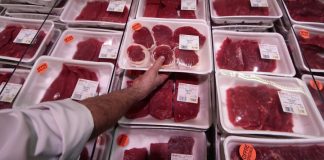
By Grace Kuria

Research released on Wednesday by World Animal Protection found high levels of contamination in many meat samples across Kenya.
The highest contamination was found in pork and chicken brands managed by supermarkets.
Dr. Victor Yamo, campaigns manager at World Animal Protection, said 95 percent of meat sold in supermarkets in Kenya contains drug-resistant bacteria, commonly known as superbugs.
Superbugs are strains of bacteria, viruses, parasites and fungi resistant to most antibiotics and other medications commonly used to treat the infections they cause.
“The results showed high prevalence of bacterial contaminants in both pork at 98.4 percent and poultry at 96.6 percent,” Yamo said.
The survey report said 187 pork samples and 206 chicken samples were collected from six supermarket chains in six counties, including Nairobi, Kisumu, Nakuru, Laikipia, Uasin Gishu and Nyeri.
“Some of these organisms might not cause disease in humans, but if you have salmonella, then there is the possibility of contamination. Of critical importance is that the disease they cause affects old and young people and sometimes can lead to death at a certain level,” said Dr. Yamo.
The report showed there is a direct correlation between how animals are treated and the quality of the end product. Dr. Yamo noted that misuse of antibiotics in the food chain is impacting on public health.
“We need to understand the interconnectivity of all this. For example, when people learn there is a problem with meat, they start buying vegetables, yet it is these vegetables that are used as feeds by some for the animals… In another 8 years, we will be doubling what we consume in terms of antibiotics and that is a worrying trend,” added Dr. Yamo.
The laboratory analysis was done at the Centre for Microbiology Research at the Kenya Medical Research Institute (KEMRI), between April 2020 and July 2020.
The study also revealed that 60 per cent of the meat in supermarkets was found to have superbugs, brought about by high usage of antibiotics to treat animals.
(With input from Agencies)